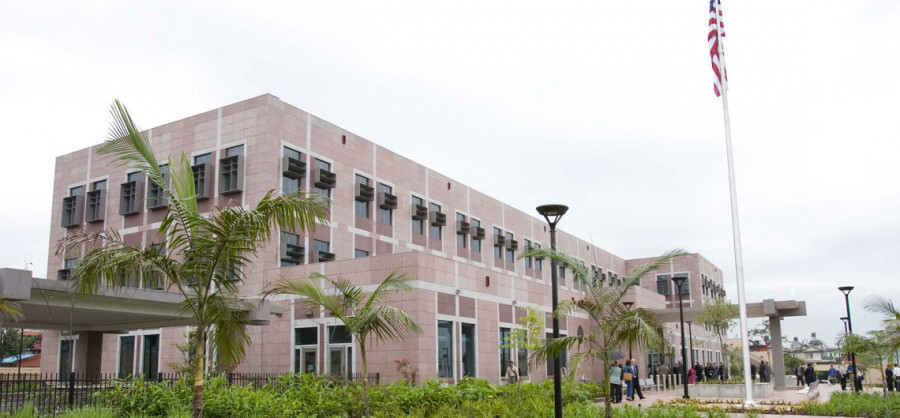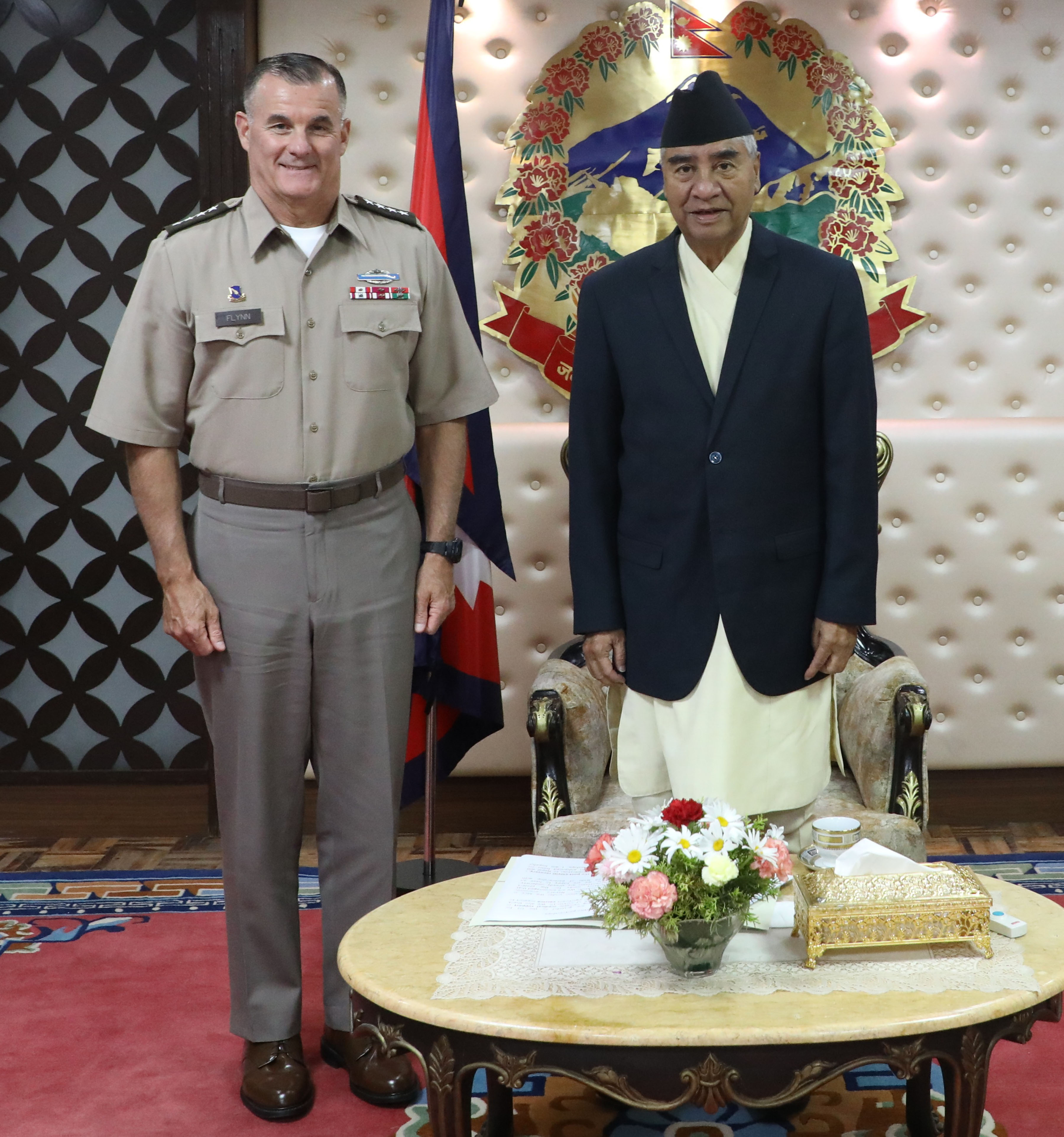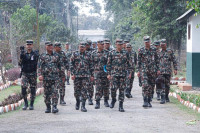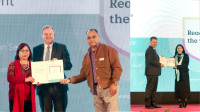National
US embassy reacts as Deuba is silent while lawmakers question SPP
Hours after US officials say Nepal became part of the State Partnership Program in 2019 as per its request, Nepal Army refutes. Law minister terms whole issue ‘a rumour’.
Anil Giri
A tempest in a teacup or a matter of grave concern?
The United States government’s State Partnership Program continued to become a topic of a hot debate on Wednesday as well, just as the American embassy in Kathmandu tried to clarify that it never was and is not a security or military alliance.
The embassy’s assertion came just as some lawmakers, including those from the ruling Nepali Congress and the main opposition CPN-UML, demanded clarification from Prime Minister Sher Bahadur Deuba if the government is planning to sign up to the State Partnership Program (SPP).
Deuba, during his meeting with coalition partners, earlier on Wednesday said that he won’t sign any agreement [with any country], including the SPP, that could bring harm to the country.
In the afternoon, Manual P Micaller, Jr, charge d'Affaires at the US embassy in Kathmandu, said that there is nothing like “proposed SPP agreement,” as he released a fact sheet on the SPP.
“That is false. Nepal applied for the SPP in 2015 and again in 2017. The United States accepted Nepal’s application in 2019,” said Micaller, referring to the document circulating in a section of the media claiming to be an agreement between the Nepal Army and the Utah National Guard of the United States. “Independent of the SPP, the US bilateral relationship that has focused on people-to-people connections including student and professional exchanges, diplomatic engagement, military partnership, trade, and common values remains strong.”
The US response followed the circulation of a purported draft of the SSP.
The draft came to the public domain immediately after the visit of US Commanding General of US Army Pacific General Flynn to Kathmandu last week. It created quite an uproar as Prime Minister Deuba and Nepal Army Chief General Prabhu Ram Sharma are set to visit the US in the near future.
Gen Sharma will be traveling to the US on June 27-July 1. Deuba is set to fly to Washington in mid-July, but an official announcement is yet to be made.
Amid speculations over the SPP, the Nepal Army on Wednesday evening said that its attention has been drawn to the long-standing cooperation and collaboration between the Nepal Army and the US Army.
In a statement, the Army said that it has not entered into any agreement or understanding with the US military or the government and there has been no process to reach such an agreement.
“The Nepal Army is always well aware of the fact and is sensitive towards it. Hence, there is no question of signing any agreement in future that could adversely affect the military sensitivities given Nepal’s non-aligned foreign policy and its specific geopolitical position,” said the Nepal Army.
The statement, however, contradicts what the US embassy says.
As per Micaller, Nepal first made a request for its participation in the SPP in 2015 and 2017. At that time, Rajendra Chhetri was the Nepal Army chief.
Chhetri told the Post that SPP is a bilateral agreement which addresses the humanitarian assistance and disaster relief, counter terrorism, peacekeeping operations, joint military training either in Nepal or in the US but it is not targeted against any third country.
Chhetri, who is currently in the US, said that he has not seen any draft related to the SPP but he believes that there are not any problematic clauses.
“There are 90 plus countries that are part of the SPP and many of them are active members of the Non-aligned Movement. I think the circulated document is just a draft and authorities concerned can examine it pointwise in order to ensure that it is in accordance with our foreign policy.”
Along the similar line, Micaller said, through the SPP, the National Guard has military-to-military cooperation in support of both countries’ security goals by leveraging whole-of-society and government relationships and capabilities.
“This especially includes a focus on humanitarian and disaster readiness which the National Guard is uniquely trained to address,” he said.
As per the fact sheet released by the embassy, the SPP is not an alliance of any kind and “it does not have a China containment too”.
“The SPP has existed for over 25 years and includes over 80 partnerships with over 90 countries, the majority of which are not in this region, and the majority of which began long ago,” said Micaller.
As far as the reference to the Utah National Guard is concerned, according to a former Nepal Army official, its involvement in Nepal is not new.
“During the 2015 earthquake, personnel from the Utah National Guard came to Nepal for search and rescue operations who were experienced in high-altitude rescue operations in such a big scale of the natural disaster,” said the retired Army official who did not wish to be named.
“Four US National Guard personnel died. Then we decided to seek support from the US side for our next round of preparations to cope with natural disasters. Accordingly, Nepal’s request for SPP was accepted in 2019. The same year, the US’ Department of Defense released the Indo-Pacific Strategy that listed the SPP under its purview, which put us in an uncomfortable position.”
After the US accepted Nepal's request to partner in the SPP, it was brought to the notice of then prime minister KP Sharma Oli.
During a meeting with visiting US Assistant Secretary of Defense for Indo-Pacific Security Affairs Randall Schriver in December 2019, then minister for defence Ishwar Pokhrel, a UML leader, said Nepal was positively considering becoming part of the SPP.
“[At that time] Oli had said they [the government] will look into the matter and asked officials to study it,” said a senior foreign ministry official. “Now the US side is looking for political ownership and commitment to the SPP from the Nepali side.”
“Since the US side listed the SPP under the Indo-Pacific Strategy, in our regular meeting of Land Force Talks between two armies, we stopped mentioning SPP because it could have ‘geopolitical’ implications as opinions of our political leadership are divided when it comes to our ties with the US and military-to-military cooperation,” the official added.
The US embassy on its part maintained that it has never pressured Nepal to partner under the SPP.
“The United States is not pressuring Nepal. Nepal applied to join the SPP twice, first in 2015 and again in 2017, and the US accepted Nepal’s request in 2019,” said the embassy.
The embassy also clarified that the SPP is not part of the Indo-Pacific Strategy.
“The SPP is mentioned in Indo-Pacific Strategy Reports, but this post-dates Nepal’s two requests to join the SPP, which began in 2015,” the embassy said. “It is once again important to remember the IPS is not a military alliance—that’s disinformation.”
According to diplomatic sources, when Nepal made the request on both occasions through the Nepal Army headquarters, it was in the knowledge of Nepal’s Ministry of Defense and Ministry of Foreign Affairs.
“Now we do not know about the debate on signing the SPP being discussed at the political level,” according to a source.

The debate on the SPP started right after the visit by US Commanding General of the US Army Pacific Charles Flynn to Nepal. During his recent visit, Flynn met with Prime Minister Deuba and Gen Sharma, the Army chief.
“Gen Flynn visited Nepal to meet with senior leadership of the government of Nepal and the Nepal Army to discuss the long US-Nepal partnership on humanitarian assistance and disaster management, and to commend Nepal for its strong support for UN Peacekeeping Missions,” said the embassy. “Gen Flynn did discuss the status of the SPP with his interlocutors but without pressure and unrelated to any requirement to sign anything.”
On whether Flynn made a proposal on the SPP and called on Prime Minister Deuba and Gen Sharma to sign it, the embassy said: “Claims to the contrary are false.”
“There was nothing handed over and there is no ‘agreement’ to sign,” it said.
Diplomatic sources said that the American side made it clear that the SPP is a win-win cooperation between Nepal and the US whose cornerstone is transparency, collaborative, cooperative and military-to-military cooperation between the two armies.
“It is up to Nepal whether it wants to be part of the SPP or not. It is the sovereign decision of the Nepal government and if the Nepal government wants to terminate it, it can,” said the diplomatic source.
Questions over the SPP have arisen also because the issue has come up immediately after Nepal’s Parliament ratified Millennium Challenge Corporation compact, which too had become a politically divisive issue. Critics argued—and still argue—that the MCC compact, under which Nepal is receiving $500 million for improving electricity transmission lines and roads, is part of the Indo-Pacific Strategy.
Washington has for long maintained that the MCC compact is purely a development assistance.
On Wednesday, the US embassy reiterated that there is “no connection whatsoever with the MCC.”
“Efforts to link the MCC with the SPP are dishonest and false,” said the embassy.
Amid the ongoing controversy, Minister for Law, Justice and Parliamentary Affairs Govinda Sharma Bandi told Parliament on Wednesday that the Nepal government hasn’t received any proposal to sign the SPP.
“Neither has the government forwarded any proposal nor received one,” said Bandi. “Let me make it very clear… This is a rumour targeted at defaming the government.”
Despite calls from lawmakers, Prime Minister Deuba, however, has not come forward to offer any statement.
Here’s a timeline of who was who from 2015 to 2019
2015
Until October, Congress’ Sushil Koirala served as prime minister and defence minister
UML’s KP Sharma Oli took over in October while UML’s Bhim Rawal served as defence minister from November onwards.
Army Chief: Rajendra Chhetri
2017
Until June, Maoist Centre’s Pushpa Kamal Dahal was prime minister and Congress’ Bal Krishna Khand was defence minister until May.
Congress’ Sher Bahadur Deuba took over from Dahal in June, as his party’s Bhimsen Das Pradhan succeeded Khand as defence minister.
Army Chief: Rajendra Chhetri
2019
UML’s KP Sharma Oli was prime minister and his party’s Ishwar Pokhrel was defence minister.
Army Chief: Purna Chandra Thapa




 21.13°C Kathmandu
21.13°C Kathmandu














